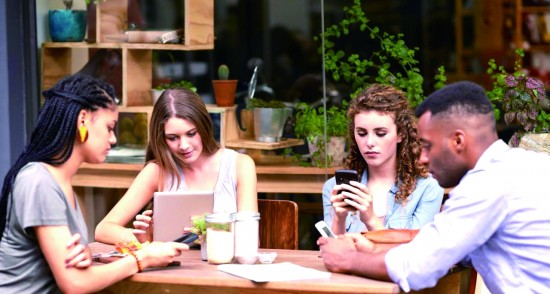No WIFI Cafe: don't use the Cafe as an Office

Since the advent of WIFI, the cafe has become the office of many people.
Chicago, on a Friday night, opened a new cafe not far from Lincoln Park. It looked nothing new at first glance-small tables, coffee tables and sofas were placed in twos and threes, with colorful thank-you cards in one corner and American flags hanging from the ceiling in the other.
Soon, however, you will feel the difference in this cafe, and you won't see cell phones, laptops or tablets. Guests are drinking coffee or wine, either chatting or playing cards. It turns out that the cafe called Kibbitznest does not offer WIFI.
Think of the shops, restaurants and coffee shops around us, providing free WIFI has almost become the most basic service. Look at the "Phubber" in Starbucks. Have you equated the cafe with the office as a matter of course? In the mobile Internet era, it is simply against the trend for stores to say no to WIFI (Kibbitznest calls this move "No FI"). However, according to the BBC, this "countercurrent" is now growing, and Kibbitznest is only the latest example-it hopes to encourage people to communicate face-to-face by banning WIFI. There are similar cafes in other parts of the United States, London, England and Vancouver, Canada.
In 1989, American sociologist Rioudiberg put forward the concept of "third space", which refers to all leisure places except the first space family and the second space office, and the coffee shop is one of them. These third spaces are essential for our mental health and social integrity. "without them, people would only exist in small isolated groups." "the only foreseeable result of technological progress is that we no longer grow and are isolated from the outside world," Odiberg wrote. "
A few years ago, Judy Warren and her husband, Philip Morris, opened a cafe in Burlington and saw Odiberg's claim come true-customers walked in, sat down and turned on their laptops, and then stared at the screen for hours. "our original intention was not to open up a space for everyone to come in and remain silent." Warren said.
So in 2012, they removed the WIFI from the store, and in 2014, they banned laptops in the store. Although at the beginning, this move brought a lot of business pressure to the couple, it soon won the understanding and support of customers. Their turnover soared by 20 per cent, compared with a 6 per cent increase in coffee shop turnover with WIFI. Kibbitznest customers also said, "I'm glad you opened such a store."
However, even if they realize that the cafe is a space for public communication, many people still use it as an office. According to Global Office Analysis, the number of Americans who work from home (who also often work in cafes) is 103% higher than in 2005, equivalent to 3.7 million people who spend at least half their time telecommuting, not counting the self-employed.
If you expand your reach globally, a Reuters survey shows that 1x5 people work from home, which is more common in Latin America, Asia and the Middle East. Jeff Issel and his wife run a cafe called Fox in the Snow in Columbus, USA. They never offer WIFI. Issel believes that nowadays, people can call anything into their homes, and self-isolation has never been more convenient, so going to a cafe should seek to communicate with others. "I want to create a vibrant store where guests come in like a big family reunion." He said.
Out of this wish, Issel hired baristas with excellent communication skills, and he lowered the height of the bar so that customers would not feel rejected. The store even canceled the plastic price tag on snacks in order to open up the chatterbox by letting customers ask about the price.
Important Notice :
前街咖啡 FrontStreet Coffee has moved to new addredd:
FrontStreet Coffee Address: 315,Donghua East Road,GuangZhou
Tel:020 38364473
- Prev

Blue Bottle, the world's first Wenqing coffee brand, and its avant-garde good surroundings
Besides selling coffee, we do more than you think. Speaking of coffee shops, if you're going to San Francisco, I'd definitely recommend Blue Bottle Coffee. This coffee shop, known as the King of Literature and Youth, has grown from an obscure niche coffee shop to Apple in the coffee world in just 10 years. Simple blue bottle L
- Next

MUJI's Henglong store in Jinan was seized of Japanese food, including candy, coffee, etc.
After the CCTV 3.15 gala exposed the influx of food into Japan's nuclear radiation area, the reporter investigated that night and found that MUJI's Jinan stores were still selling prohibited food. On the morning of the 16th, the Jinan Food and Drug Department conducted a surprise inspection of MUJI Henglong's store and seized all Japanese food on the spot. The food seized at the scene included more than a dozen kinds of products, such as candy and coffee, but it was not found that the reporter picked it last night.
Related
- Can lightly roasted coffee beans be used to extract espresso? How finely should you grind high-quality coffee beans to make Italian latte?
- What is the difference between the world's top rose summer coffee and Yejia Shefi? What are the flavor characteristics of Yega Shefi coffee and Panama rose summer?
- The ceremony is full! Starbucks starts to cut the ribbon at a complimentary coffee station?!
- A whole Michelin meal?! Lucky launches the new "Small Butter Apple Crispy Latte"
- Three tips for adjusting espresso on rainy days! Quickly find the right water temperature, powder, and grinding ratio for espresso!
- How much hot water does it take to brew hanging ear coffee? How does it taste best? Can hot water from the water dispenser be used to make ear drip coffee?
- What grade does Jamaica Blue Mountain No. 1 coffee belong to and how to drink it better? What is the highest grade of Blue Mountain coffee for coffee aristocrats?
- What are the flavor characteristics of the world-famous coffee Blue Mountain No. 1 Golden Mantelin? What are the characteristics of deep-roasted bitter coffee?
- Can I make coffee a second time in an Italian hand-brewed mocha pot? Why can't coffee be brewed several times like tea leaves?
- Hand-brewed coffee flows with a knife and a tornado. How to brew it? What is the proportion of grinding water and water temperature divided into?

